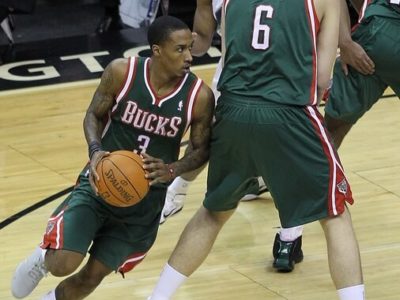Something stinks in the NBA. Players are now becoming their own personal general managers and dictating which teams they want to play for. LeBron James and Carmelo Anthony were pioneers, Dwight Howard is putting his best foot forward and now Brandon Jennings is following suit.
Jennings, the Milwaukee Bucks’ point guard, said Thursday he’ll look to explore larger-market teams when his rookie contract expires. “I am going to keep my options open, knowing that the time is coming up. I'm doing my homework on big market teams … I'm not saying I won't [sign an extension with the Bucks] and I'm not saying I will. I'm just keeping my options open. When you start seeing other players like Dwight Howard or CP3, you start thinking … It's just that I'm understanding the business of basketball now.''
The business of basketball – is this what the sport has come to? Jennings is 22, but he’s hardly acting his age. Jennings certainly isn’t making outlandish trade requests. He’s not alienating his teammates or giving anything less than 100 percent night in and night out. But he is reducing himself to the new culture in the NBA, that he can skip town for a bigger city and play alongside a fellow superstar.
Well, Brandon, that’s just not cool. I had a conversation with somebody this week whom I met for the first time. We discussed the NBA of the 90s, when you could name a superstar on each team. There was Jordan’s Bulls, Ewing’s Knicks, Barkely’s Suns, even the “Bad Boy” Pistons. Now it seems like the elite players are flocking to the same cities – Miami, Chicago, New York, Los Angeles.
Jennings needs to take notice of the players like Kevin Durant and Kevin Love, who demonstrated loyalty to their teams and cities. They’re the reason why this league is so great. Durant is arguably the best scorer in the NBA, and Love is a double-double factory. Do you not think the Bulls couldn’t use an offensive juggernaut like Durant, or that the Knicks could use a low-post player like Love? Durant and Love know they’re wanted commodities, but they chose to stay in their markets, with teams that would not even be close to competitive without them.
Durant and Love both quietly signed extensions with the Thunder and Timberwolves, respectively. There were no months of speculation about Durant’s contract details; in fact, he did it behind closed doors, then tweeted about it. And sure, we knew Love was seeking an extension, but did he threaten to leave if management didn’t concede? Did he demand the T-Wolves try to trade for Chris Paul or make a splash in free agency? No, he went about his business with class.
 Oklahoma City is like the 30th-biggest city in the United States, people, and Minneapolis – well, let’s just say Omaha, Neb. has a larger population. But despite not playing on the biggest of stages, both of these players have changed the culture of these franchises, and both teams are competitive because of their propriety. Small market – who cares? Both Durant and Love are proving that you can be a superstar no matter where you play or what jersey you wear.
Oklahoma City is like the 30th-biggest city in the United States, people, and Minneapolis – well, let’s just say Omaha, Neb. has a larger population. But despite not playing on the biggest of stages, both of these players have changed the culture of these franchises, and both teams are competitive because of their propriety. Small market – who cares? Both Durant and Love are proving that you can be a superstar no matter where you play or what jersey you wear.
In his third season as a pro, Jenning is on his way to stardom. He's the Bucks leading scorer, and right now he has the team poised to make the postseason. He's not yet a brand name like LeBron or Melo, but he's certainly on his way. The expectations in Milwaukee aren't as lofty as they are in L.A. or Boston. So what? The Bucks are competitive, a team on the upswing — that's what made the NBA great two decades ago and that's what will continue to make the league thrive today.
Brandon, even Dwight, take notice. Look at what LeBron endures on a daily basis between the haters on Twitter and the pressure from the media. Ask Carmelo what a 39-year championship drought in the Big Apple feels like. The bright lights are great, but everybody is watching. Trying to win a title is already an arduous task; dictating where you want to win that trophy only elevates the pressure.



















